Index relies entirely on the support of donors and readers to do its work.
Help us keep amplifying censored voices today.
[vc_row][vc_column][vc_column_text]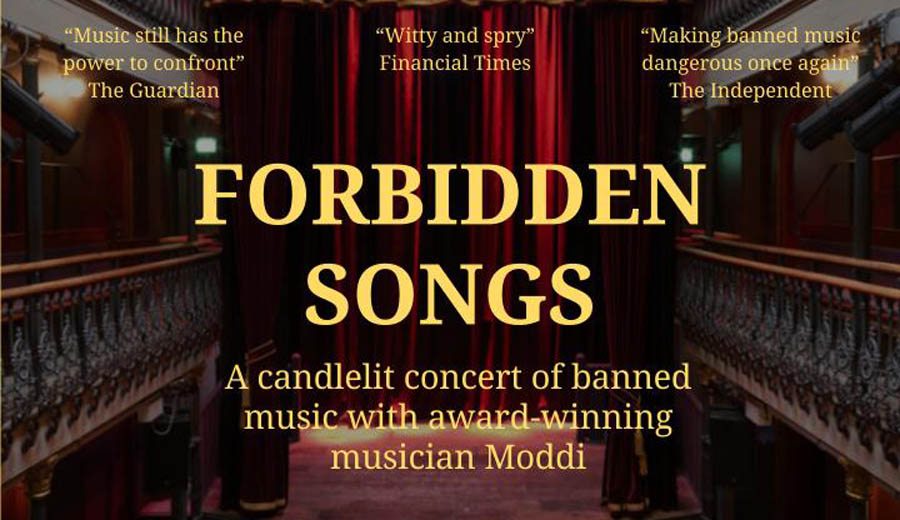
Join Index on Censorship for a candlelit evening of songs censored and silenced, played live by award-winning Norwegian musician Moddi.
Set in the beautifully restored Victorian Hoxton Hall, this one-night-only celebration will feature banned songs from around the world, from artists including Pussy Riot and Kate Bush. Following a sell-out European tour, this is an exclusive opportunity to see a brilliant musician in one of London’s historic East End venues. Moddi’s remarkable collection reveals untold stories of censorship, persecution and repression. Guests will be greeted with a complimentary beer courtesy of cult craft brewery Flying Dog – and the party will continue long after the songs have ended.
We’re also raffling fantastic prizes including a luxury London hotel stay, a Whole Foods gift hamper worth £200, a month’s supply of Divine Chocolate, a case of Flying Dog beer, autographed books by legendary comedy writer John O’Farrell and much more.
If you can’t make the gig, but still want to be in with a chance of winning, donate now to Index on Censorship. Anyone who donates £10 or more between now and December 7 will be entered in to the raffle. (Entrants must be UK-based and be able to collect their prizes in person from our London office by 16 December.)
The event is in support of leading freedom of expression charity Index on Censorship, amplifying the voices of musicians, artists and others around the world who are currently facing censorship and repression.
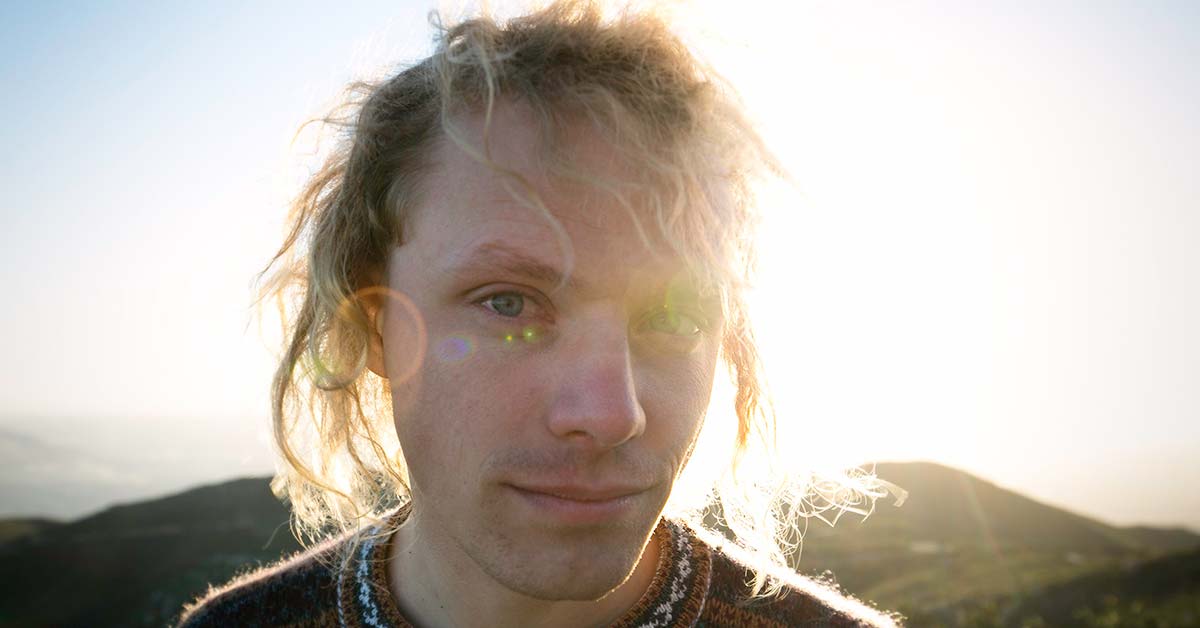
Moddi (Photo: Jørgen Nordby)
On Moddi:
“Making banned music dangerous once again.” The Independent
“Music still has the power to confront authority” The Guardian
“Witty and spry” Financial Times
“A brave, thought-provoking, musically adventurous project” The Quietus
“An eye-opening lesson in the importance of music” Mojo
Moddi will be performing songs from his Unsongs album:
Raffle prizes include:
Winners will be notified by Monday 12 December.
With special thanks to Flying Dog Brewery and Divine Chocolate.
[/vc_column_text][/vc_column][/vc_row][vc_row][vc_column][vc_column_text css=”.vc_custom_1479913488017{border-radius: 5px !important;}”]
[/vc_column_text][/vc_column][/vc_row][vc_row][vc_column][vc_basic_grid post_type=”post” max_items=”4″ element_width=”6″ grid_id=”vc_gid:1480676862346-6d87ad32-a927-9″ taxonomies=”8497″ exclude=”82268″][/vc_column][/vc_row]
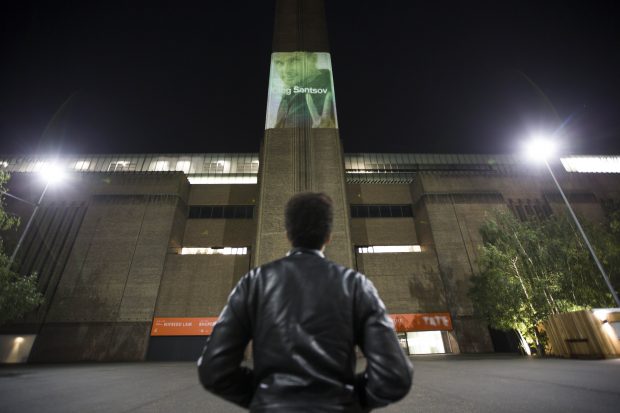
10 October 2016: Belarus Free Theatre project Ai Weiwei’s symbol of freedom of expression onto five iconic buildings across London to highlight the case of Oleg Sentsov. Credit: Graeme Robertson
The Belarus Free Theatre, which campaigns for free expression in Belarus, is calling on the British government to pressurise the Russian authorities to release prisoners whose only crime is to have opposed the annexation of Crimea, an act that the British Government has declared illegal.
“We urgently call upon British politicians to put justice, human rights and international law ahead of business interests and to look afresh at the cases of the Kremlin hostages, [and] all political prisoners held by Russia, including our friend Oleg Sentsov,” co-founding artistic director of Belarus Free Theatre, Natalia Kaliada said.
On Monday 10 October, the theatre company hosted Freedom of Expression in Ukraine, an event at the House of Commons, in solidarity with Oleg Sentsov, a popular film director and pro-Ukrainian activist serving a 20-year prison sentence as well as all other Ukrainian political prisoners currently detained in Russian jails.
Sentsov is currently imprisoned in Siberia and is facing 18 more years in jail on charges of being part of a terrorist conspiracy. Sentsov has stated that he was tortured by investigators, and that a key witness recanted in the courtroom on the grounds that evidence had been extorted under torture. His lawyers describe the case against him as “absurd and fictitious”.
The night included a film calling for Sentsov’s release featuring actor Simon Callow, Belarusian Nobel Laureate for Literature Svetlana Alexievich, Polish film director and chair of European Film Academy Agnieszka Holland, actor Will Attenborough, film director Yuri Khaschevatsky and fashion designer and activist, Vivienne Westwood.
Natalia Kaplan, a cousin of Sentsov, could not be in London for the event but recorded a special video appeal for his release.
Pussy Riot’s Maria Alyokhina and members of Belarus Free Theatre read extracts of letters from Sentsov and short scenes from Belarus Free Theatre’s latest production, Burning Doors. Other speakers included Andrei Khliyvynuk, activist and frontman of Ukrainian supergroup Boombox, and film and theatre-director-turned-soldier Eugene Stepanenko.
Nobel Laureate for Literature Svetlana Alexievich and British filmmaker Lord Puttnam both recorded a special message for the event.
Sentsov first came to the attention of the international film world with Gamer, a debut feature inspired by the computer and video-gaming club for young people that he had founded. It opened to great acclaim at the Rotterdam International Film Festival in 2012.
The European Film Academy together with leading international film directors, including Pedro Almodóvar, Wim Wenders, Stephen Daldry, Mike Leigh and Ken Loach, have campaigned for Sentsov’s release, echoing the grave concerns of Amnesty International that his trial was a “total fiasco” and that the “entire case for the prosecution is built on a house of cards”.
Fernando Bovaira named Sentsov an honorary member of the 62nd San Sebastian Film Festival’s main competition jury, and a chair was reserved for him in solidarity.
During the evening, an image of Ai Weiwei’s middle finger was projected onto five iconic buildings in London: The National Gallery’s Sainsbury Wing, The Forth Plinth in Trafalgar Square, Royal Opera House, Soho’s Gerrard Street and Tate Modern, together with a short film of Sentsov’s “sham trial” to garner UK public support and attention to his plight.
Ai’s finger, is used as a symbol of freedom “a powerful reminder of the need to strive for justice and freedom of expression,” explained Kaliada.
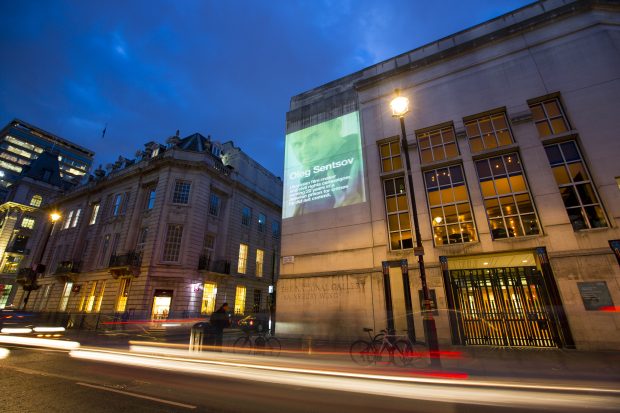
Credit: Graeme Robertson.
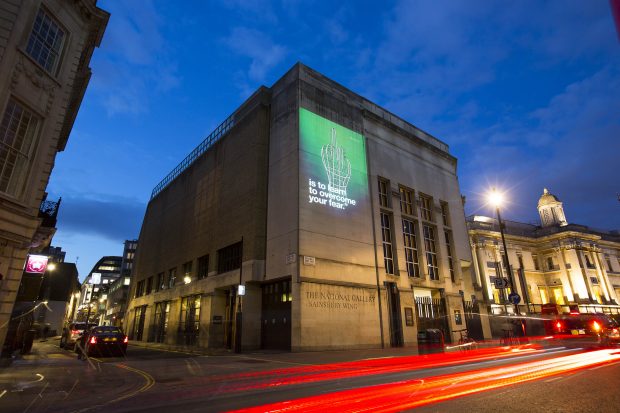
Credit: Graeme Robertson
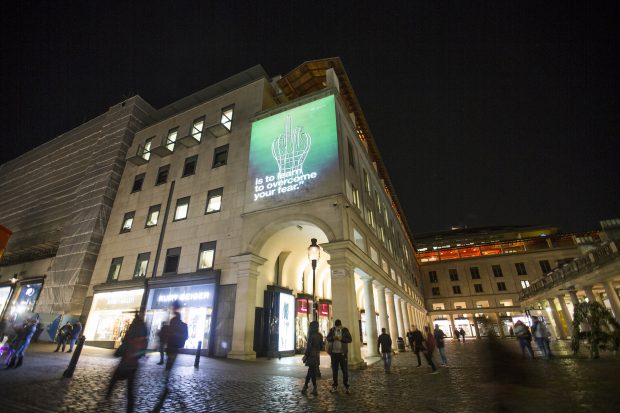
Credit: Graeme Robertson
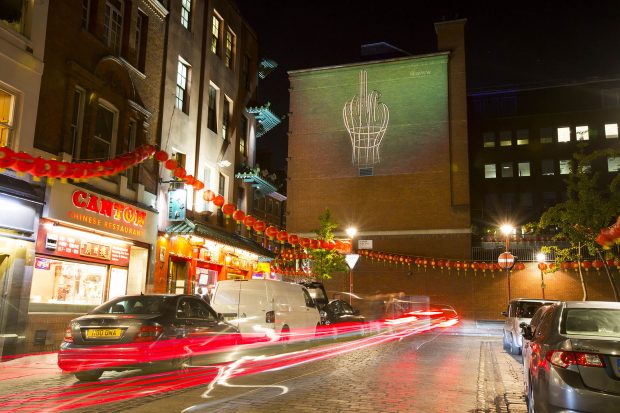
Credit: Graeme Robertson
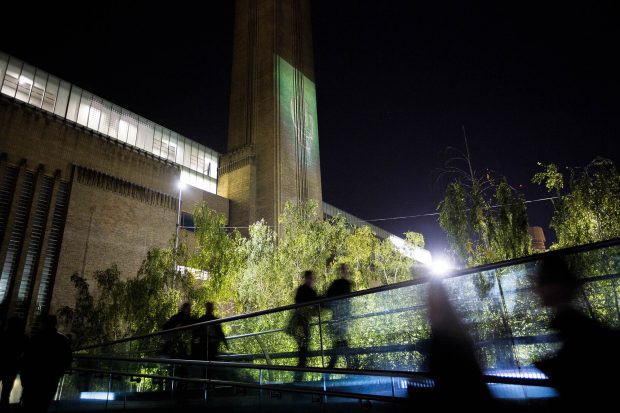
Credit: Graeme Robertson
The demonstration was part of Belarus Free Theatre’s I’m with the Banned campaign which is an artist-led effort to bring together those who live in political freedom in solidarity with artists and activists who are censored or imprisoned in Belarus, Russia, Ukraine and anywhere else in the world where justice and freedom are denied.
Kaliada said: “In recent months, Ukraine has disappeared off the public radar even though the war rages on and Russia continues to drag the world into a new Cold War at a highly sophisticated level that endangers people living in the geopolitical knot known as Ukraine, Belarus and Russia, as well as threatening the global security of people further across the world.”
She said that London is where the founding members of Belarus Free Theatre sought shelter five years ago when they arrived in the UK as political refugees from Belarus.”For one night, the walls of the city will speak on behalf of those who are silenced, and one of the greatest capitals of the world will stand with us in solidarity with Oleg Sentsov,” she said. “As contemporary artists and human beings we have only one tool: creativity.”
Norwegian musician Moddi has collated an album of songs from around the world that had been banned, censored or silenced. Unsongs includes cover versions of songs from countries including China, Russia, Mexico and Vietnam, on topics such as drugs, war and religion. Index has put together a playlist of some of these songs to coincide with the release of the 250th issue of Index on Censorship magazine, which includes a feature by Moddi about the inspiration behind the album.
1. Izhar Ashdot – A Matter of Habit
Israeli singer Izhar Ashdot was preparing to sing A Matter of Habit on army radio station Galatz in 2012 when he received a message saying it wasn’t welcome. The station stating “We should avoid celebrating a song that demonises our soldiers.” The song describes the fear and confusion of Israeli soldiers, until “killing is a matter of habit”.
2. Pussy Riot – Punk Prayer
Punk Prayer became internationally known after Russian feminist punk band Pussy Riot staged a performance of the song at Moscow’s Cathedral of Christ the Saviour. The group said it was a protest against the Orthodox church’s support for Russia’s President Vladimir Putin. Three members of the group were sentenced to two years in prison for “hooliganism motivated by religious hatred”.
3. Kate Bush – Army Dreamers
Kate Bush’s 1980 hit Army Dreamers tells the story of a mother’s grief after her son is killed in battle, and reflects the brutality and emotional effects of military conflict. During the Gulf War the BBC were wary of playing songs with an anti-war sentiment and told to think carefully before playing them.
4. Victor Jara – Prayer for a Worker
Chilean folk singer Victor Jara was killed in the 1973 military coup that overthrew socialist president Salvador Allende. His songs followed a theme of peace and social justice. A Prayer for a Worker highlights the failed attempts of the Christian Democratic Party and the Socialist Party to reconcile before the coup.
5. Los Tucanes di Tijuana – My Three Animals
In their 1990s narco-corrido (drugs ballad) Mis Tres Animals, Mexican group Los Tucanes di Tijuana sing of drug-trafficking but disguise cocaine, marijuana and heroin with the names of animals: a parrot, a goat and a rooster. The song made it on to the radio thanks to this word play, but narco-corridos are often censored as they are blamed for encouraging drug use and trafficking.
6. Richard Burgess – Eli Geva
Eli Geva was an soldier who refused to lead his forces into Beirut during the 1982 Lebanon war. His act caused a great deal of controversy in Israel, and Geva became an icon for the peace movement. This ode to the Israeli commander was written by Richard Burgess and performed by Norwegian singer Birgitte Grimstad, but Grimstad was warned against singing the song during a tour in Israel. The above video is Moddi’s cover version.
7. Billie Holiday – Strange Fruit
Strange Fruit, originally recorded by Billie Holiday in 1939, was a protest against the brutality and racism in the United States, particularly the lynching of African Americans. Holiday approached both her record label and producer about recording the song but they turned it down, fearing a negative reaction. Instead a friend, Milt Gabler, helped her to record and distribute the song after her a cappella version of it bought him to tears.
Order your full-colour print copy of our journalism in danger magazine special here, or take out a digital subscription from anywhere in the world via Exact Editions (just £18* for the year). Each magazine sale helps Index on Censorship fight for free expression worldwide.
*Will be charged at local exchange rate outside the UK.
Magazines are also on sale in bookshops, including at the BFI and MagCulture in London, Home in Manchester, Carlton Books in Glasgow and News from Nowhere in Liverpool as well as on Amazon and iTunes. MagCulture will ship anywhere in the world.
Belarus Free Theatre have been using their creative and subversive art to protest the dictatorial rule of Aleksandr Lukashenko for over a decade.
Facing pressure from authorities since their inception, the theatre company nonetheless thrived underground, performing in apartments, basements and forests despite continued arrests and brutal interrogations. In 2011, while on tour, they were told they were unable to return home. Refusing to be silenced, the group set up headquarters in London and continued to direct projects in Belarus. In 2016 the group was shortlisted for Index on Censorship’s Freedom of Expression Arts Award.
Co-founder Natalia Koliada tells Index why the company is crowdfunding for its production of Burning Doors.
Why is it important to mount Burning Doors at this time?
Koliada: Freedom of expression in that geopolitical knot where we come from and where more than 200 million people live under severe pressures of authoritarian and dictatorial regimes. If we do not talk and alert people living in western, democratic countries to our stories, their countries will be infiltrated in different forms, initially unnoticeably, by people manipulating the authorities who say it’s all in the name of the law.
Where did the idea come from?
Koliada: The idea behind Burning Doors is at the heart of Belarus Free Theatre. Close your eyes, just for a moment, and imagine that a theatre company based here in the UK could be prohibited to perform shows by Mark Ravenhill and Sarah Kane, and needs to perform underground. Even operating underground, the actors and managers could be arrested by MI5, riot police or the Met, and audience members threatened and told that they could lose their jobs and education.
(Our audience is a very young one and, of course, they are not scared of the secret services, so what would happen in those cases is that their parents would be threatened with professional retribution.)
I’ll continue and ask you to imagine that all of it has happened and continues to happen to a UK based-theatre company, one that is known and performs across the world, and yet can only exist because its founding members are exiled from their homeland and they now have political asylum in the UK. This has been our story for the past 11 years.
It’s in our blood to feel all the symptoms of dictatorship. Last year when we mounted Staging A Revolution: I’m with Banned which brought international attention to banned artists in Belarus, Ukraine (Ukrainian artists who spoke out against the Russian military invasion of Ukraine and are now prohibited in Russia), and Russia, it was the first time anyone had mounted an artistic solidarity event with Eastern Europe since the collapse of the Soviet Union.
Around the same time that the Festival took place, filmmaker Oleg Sentsov and contemporary artist Petr Pavlensky were arrested. Masha Alekhina, a member of Pussy Riot who served two years in jail, got in contact with us and suggested we work together. We knew we had to do it. We were intrigued by the artistic possibilities of working with a real witness talking about her own personal experiences and bringing her into our Minsk-based ensemble of actors, the most talented and bravest in the world. We wanted to connect Masha’s story to those of other persecuted contemporary actors and through a prism of their personal stories to speak openly about the hypocrisy of politicians and to inspire our audiences to reflect on the reality that we as human beings need to stand up together against repressive regimes. It’s important for us to reemphasise that we are not heroes, we are not victims, we are contemporary artists.
Does BFT think that building cross-border alliances with artists will have an impact on the threats to freedom of expression?
Koliada: Any cross-borders alliances of artists expands audiences. It transforms all of us into a movement. Why do dictators put contemporary artists into jails? Because they want to show with a single example that it’s dangerous to resist systems through the arts. They become scared when we stand up together against them. It’s very simple in thought and action but this is what makes them go into panic mode. Ai Wei Wei was under a house arrest when he created the visual icon for our campaign, Staging A Revolution: I’m with Banned. More than 600,000 people across the world saw it online, and people from more than 37 countries supported our campaign. This kind of collective action makes dictators feel sick and it’s then that they start to make the mistakes that lead to their collapse.
It’s unprecedented for us as a theatre company making work for more than eleven years under dictatorship to collaborate with a woman who served a two-year term in a Russian jail. Within days of announcing this collaboration to the media in the UK, it spread across the world. Even this level of coverage is terrifying to people like Putin or Lukashenko because it demonstrates the tidal wave of support for non-violent resistance by creating art. Art is more powerful than political rhetoric. When Mick Jagger, Tom Stoppard and Vaclav Havel made a video supporting the people of Belarus, we were arrested by the KGB. They knew that it was instigated and created by members of BFT. We understood then that the support of artists across the world was more terrifying to them than statements from politicians.
I think it’s time for all of us to make steps forward and to start to act together with artists, human rights defenders, politicians and journalists, because dictators are scared of a strong mutual position.
How has BFT’s mission evolved since being founded a decade ago?
Koliada: From the very beginning we were only interested in people. Human life is the most interesting subject matter for us. We started with our own personal taboos, then society’s taboos, then moved onto a global dimension. The only thing that is unchanging is our fundamental interest in people. When we perform in different continents across the world, people tell us that they find our work so powerful because they always find themselves within us. And likewise, we find ourselves in our audiences.
How else can people support BFT and Burning Doors?
Koliada: Information is the key. If people know what we do, why and how, we have the chance to continue to exist. People knowing of our existence and our work helps on many different levels including our financial sustainability. Last week, President Obama extended sanctions in Belarus stating that Belarus is “an unusual and extraordinary threat to the national security of the United States of America and its foreign affairs”. Yet at the same time, the EU is playing a badly orchestrated geopolitical rebranding game to try to convince people that “Belarus is normal”. It’s not. It has been a dictatorship in Europe for 22 years, political opponents have been murdered and their bodies never found. Those who perpetrated those crimes are still in power. Even this week, there is a trial underway against Eduard Palchis, who is a blogger and journalist. It seems that Belarus might have seized another political prisoner if human rights organisations across the world do not intervene.
And for BFT more specifically, this month we launched our first-ever Kickstarter campaign. We need to raise £20,000 in the month of June to bring our tireless, extraordinarily brave troupe of actors to the UK to work with them on our new work, Burning Doors. Every pound will help us get there. Please consider finding out more and supporting us today.